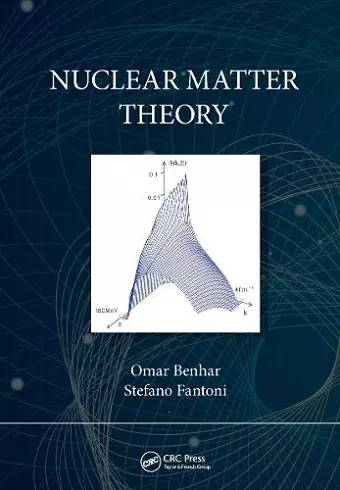Nuclear Matter Theory
Omar Benhar author Stefano Fantoni author
Format:Paperback
Publisher:Taylor & Francis Ltd
Published:13th Dec '21
Currently unavailable, and unfortunately no date known when it will be back
This paperback is available in another edition too:
- Hardback£160.00(9780815386667)

Authored by two of the most respected experts in the field of nuclear matter, this book provides an up-to-date account of developments in nuclear matter theory and a critical comparison of the existing theoretical approaches in the field.
It provides information needed for researchers working with applications in a variety of research fields, ranging from nuclear physics to astrophysics and gravitational physics, and the computational techniques discussed in the book are relevant for the broader condensed matter and quantum fluids community.
- The first book to provide an up-to-date and comprehensive overview of nuclear matter theory
- Authored by two world-leading academics in this field
- Includes a description of the most advanced computational techniques and a discussion of state-of-the art applications, such as the study of gravitational-wave emission from neutron stars <
"Nuclear matter became an important part of the engineering/physics curriculum in the late 20th century with the discovery and first observations of neutron stars. In this volume, Benhar (Sapienza Univ. of Rome) and Fantoni (International School for Advanced Studies, Trieste) focus particularly on nuclear dynamics and nuclear matter properties to explain nuclear matter theory (NMT), which is itself an overlap of nuclear physics and the physics of quantum fluids.
Following the introduction of essential concepts, they present corresponding equations through a discussion of analytic methods. Since this is a relatively new field, not much material has been available in the form of textbooks, although numerous research papers appear every year. This volume beautifully provides a concise but extensive account of NMT. Chapters 1 and 2 summarize different non-relativistic nuclear models. Chapters 3 and 4 briefly address nuclear matter properties and different approximation methods, including mean-field, perturbation, and variational. Chapter 5 deals with more advanced variational methods. Finally, chapters 6 and 7 describe the application of such measures to the observation of neutron stars and the constraints obtained by astrophysical data.
This book can serve as a good reference text for graduate-level students pursuing research in nuclear physics and related theory. Summing Up: Recommended. Graduate students and faculty."
-M. O. Farooq, Embry-Riddle Aeronautical University in CHOICE, September 2021 Vol. 59 No. 1
ISBN: 9781032239750
Dimensions: unknown
Weight: 308g
168 pages